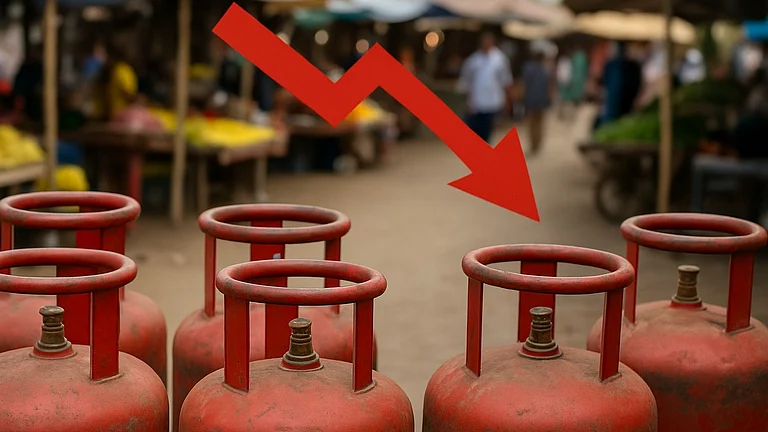An industry source said if the reduction in benchmark rate was the only criterion for deciding the price cut, LPG rates should have then been cut in July.
But the decision is political.
Cooking gas prices have shot up in the last couple of years and have become a major election issue.
The Congress party used the high LPG prices, which had burnt a hole in the budgets of households already reeling under high inflation, effectively in the recently concluded assembly elections in Karnataka.
It has promised to give LPG at Rs 500 per cylinder if voted to power in Madhya Pradesh, where elections are due in November-December. The Congress is also providing the LPG at the same price in Rajasthan, where elections are due in November-December.
The Rs 200 per cylinder subsidy provided to Ujjwala consumers would cost Rs 7,680 crore in the current financial year ending March 31, 2024 (April 2023 to March 2024).
While Ujjwala beneficiaries are only 9.6 crore, there are some 33 crore domestic cooking gas users in the country.
The government in June 2020 stopped giving LPG subsidies. Cooking gas across the country was priced at market rate, which rose to Rs 1,103 in the national capital.
The only subsidy that was available was for poor women who got free connections under Pradhan Mantri Ujjwala Yojana. The government gave Rs 200 per cylinder subsidy for up to 12 refills in a year. This subsidy was transferred into the bank accounts of the beneficiaries, who bought LPG at market price from the dealer.
The government in October 2022 provided a one-time grant of Rs 22,000 crore to oil companies to cover for the losses they had incurred on selling LPG at below cost in the previous two years.
This is not going to be repeated this time, another source said.
Bumper earnings in the first five months of the current fiscal and international benchmark coming off its highs will help state-owned oil companies absorb the Rs 200 per cylinder cut in cooking gas LPG prices, sources said indicating there may be no government compensation for that.
On Tuesday, the government announced a Rs 200 per cylinder cut in prices of domestic cooking gas to soften the impact of rising inflation on households as well as counter the promise of cheaper LPG made by the Congress party in upcoming assembly elections.
This resulted in the price of a 14.2-kg LPG cylinder in the national capital coming down to Rs 903 from Rs 1,103 earlier. For Ujjwala beneficiaries, the price will be Rs 703 after considering the continuing Rs 200 per cylinder subsidy.
State-owned Indian Oil Corporation (IOC), Bharat Petroleum Corporation Ltd (BPCL) and Hindustan Petroleum Corporation Ltd (HPCL) posted bumper earnings in the April-June quarter and the trend is continuing in thereafter, government and industry sources said.
Also, Saudi CP - the price to which domestic LPG rates are benchmarked due to high import dependence - declined from USD 732 per tonne in March 2023 to USD 385 in July. Rates have gone up in August to USD 464 per tonne but still provide enough cushion for oil companies to cut LPG prices, they said.
Oil Minister Hardeep Singh Puri in television interviews on Wednesday said the three oil marketing companies cut the prices as "good corporate citizens" and the extension of "very healthy profits" of April-June (the first quarter of the current fiscal) in the following months will help their decision.
He however did not give a direct reply to questions on the government providing subsidy support for the decision.
Sources said the price cut is on oil companies and the government has so far not indicated any intention to provide for those.
The three firms booked under-recoveries or losses when Saudi CP had shot up in March/April. The losses are yet to be recovered, they said.
What may have compounded their woes is the rise in rates in August. Saudi CP for propane has gone up to USD 470 per tonne in August and that for butane to USD 460. This compares to USD 400 per tonne rate for propane and USD 375 for butane in July.
A mix of propane and butane results in the creation of LPG.
The three firms posted healthy profits in April-June as the freeze on petrol and diesel prices revision despite the fall in oil prices helped margins.
IOC reported a net profit of Rs 13,750.44 crore, BPCL Rs 10,644 crore and HPCL a net profit of Rs 6,203.90 crore. This compared to heavy losses in the same period of last year.
Last year, the three froze retail petrol and diesel prices to cushion domestic consumers from rising international oil rates.
That freeze led to the three retailers suffering heavy losses in not just the April-June 2022 period but also in the subsequent quarter.
Margins on petrol and diesel turned positive earlier this year on the softening of international oil prices, but rates were not revised, and the companies recouped losses they incurred last year.
IOC, BPCL and HPCL temporarily abandoned the daily price revision last year and have not revised petrol and diesel prices in line with the cost. And the losses they incurred when the oil prices were higher than the retail selling prices were recouped with rates dropped. The same is true for LPG as well.
Petrol and diesel prices have been on a freeze for a record 16 months in a row.
Puri said the government ensured that affordability and availability of fuel and the common man is not hit by the volatility in oil prices that followed the Russia-Ukraine conflict of February last year.


























.jpg?w=200&auto=format%2Ccompress&fit=max)




